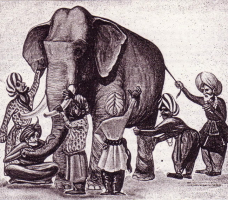January 6, 2017
Thirteen ways the physical environment shapes knowledge management
 Knowledge management (including its creation, transference and storage) within an organisation is now widely considered to be one of the primary drivers of a business’s sustainability. Driven by changing demographics, businesses are recognising the ways in which valuable knowledge is lost when employees leave the organisation, including when they retire or are made redundant in response to changing economic conditions. Geyer, an Australian design practice, is just one organisation that has undertaken important research to understand the role of the physical environment in knowledge management.The aim of the research was to explore the kinds of environments and their attributes (if any) that could support the management of knowledge in an organisation. The research also aimed to expand the focus of existing knowledge management literature; from information technology to workplace design.
Knowledge management (including its creation, transference and storage) within an organisation is now widely considered to be one of the primary drivers of a business’s sustainability. Driven by changing demographics, businesses are recognising the ways in which valuable knowledge is lost when employees leave the organisation, including when they retire or are made redundant in response to changing economic conditions. Geyer, an Australian design practice, is just one organisation that has undertaken important research to understand the role of the physical environment in knowledge management.The aim of the research was to explore the kinds of environments and their attributes (if any) that could support the management of knowledge in an organisation. The research also aimed to expand the focus of existing knowledge management literature; from information technology to workplace design.














 According to new research from the Chartered Institute of Personnel and Development, the number of people saying that they have experienced mental health issues while in employment has climbed from a quarter to a third over the last five years. Despite this, the majority of employees still don’t feel that people experiencing mental health issues are supported well enough at work. In response, the CIPD is calling on organisations to take a more preventative approach to employees’ mental wellbeing, encouraging a culture of openness in their workplace, whilst at the same time, training line managers to provide and signpost support for employees, in order to create healthier, more engaged and more productive workplaces. The new research from the CIPD claims that in 2016, almost a third (31 percent) of the over 2,000 employees surveyed said they have experienced a mental health problem at some point during their working life, compared with a quarter (26 percent) in 2011.
According to new research from the Chartered Institute of Personnel and Development, the number of people saying that they have experienced mental health issues while in employment has climbed from a quarter to a third over the last five years. Despite this, the majority of employees still don’t feel that people experiencing mental health issues are supported well enough at work. In response, the CIPD is calling on organisations to take a more preventative approach to employees’ mental wellbeing, encouraging a culture of openness in their workplace, whilst at the same time, training line managers to provide and signpost support for employees, in order to create healthier, more engaged and more productive workplaces. The new research from the CIPD claims that in 2016, almost a third (31 percent) of the over 2,000 employees surveyed said they have experienced a mental health problem at some point during their working life, compared with a quarter (26 percent) in 2011.
 Office politics is the one thing many young people are least prepared for when starting their first job, according to a new study by the Co-op. The study comes as many them are about to enter the workforce for the first time. With more young people opting for the world of work in the form of apprenticeships and on the job training rather than higher education, the members of ‘Generation Y’ often find they are unprepared for these softer skills needed to get on in the office according to the poll of 1,100 16-25 year olds. Over half of young people (54 percent) said that they were not prepared or informed about office politics. The study is part of the Co-op’s campaign to champion young people in the workplace by taking a closer look at what motivates 16-25 year olds. The research suggests that young people could find it harder to express opinion and ideas in the workplace, which in turn could lead them to feel isolated and unsupported.
Office politics is the one thing many young people are least prepared for when starting their first job, according to a new study by the Co-op. The study comes as many them are about to enter the workforce for the first time. With more young people opting for the world of work in the form of apprenticeships and on the job training rather than higher education, the members of ‘Generation Y’ often find they are unprepared for these softer skills needed to get on in the office according to the poll of 1,100 16-25 year olds. Over half of young people (54 percent) said that they were not prepared or informed about office politics. The study is part of the Co-op’s campaign to champion young people in the workplace by taking a closer look at what motivates 16-25 year olds. The research suggests that young people could find it harder to express opinion and ideas in the workplace, which in turn could lead them to feel isolated and unsupported.
 There is an ancient Asian parable which has found its way into a number of cultures including Hindu and Buddhist lore. In one version, the Buddha tells of a king who has nine blind men summoned to his palace. An elephant is brought in and they are asked to describe it. Each man feels a different part of the elephant and describes it to the king. In turn they tell him it is a pot (the man who feels the head), a winnowing basket (ear), a ploughshare (tusk), a plough (trunk), a granary (body), a pillar (foot), a mortar (back), a pestle (tail) or a brush (tip of the tail). They disagree violently with each other to the amusement of the king, and the Buddha surmises that ‘in their ignorance they are by nature quarrelsome, wrangling, and disputatious, each maintaining reality is thus and thus.’ Around 2,500 years later, groups of people continue to describe big things solely based on the bits with which they come into contact and bicker with others who are close to other bits.
There is an ancient Asian parable which has found its way into a number of cultures including Hindu and Buddhist lore. In one version, the Buddha tells of a king who has nine blind men summoned to his palace. An elephant is brought in and they are asked to describe it. Each man feels a different part of the elephant and describes it to the king. In turn they tell him it is a pot (the man who feels the head), a winnowing basket (ear), a ploughshare (tusk), a plough (trunk), a granary (body), a pillar (foot), a mortar (back), a pestle (tail) or a brush (tip of the tail). They disagree violently with each other to the amusement of the king, and the Buddha surmises that ‘in their ignorance they are by nature quarrelsome, wrangling, and disputatious, each maintaining reality is thus and thus.’ Around 2,500 years later, groups of people continue to describe big things solely based on the bits with which they come into contact and bicker with others who are close to other bits.




















July 22, 2016
The people centric urge to personalise space helps firms to engage employees 0
by Paul Goodchild • Case studies, Comment, Wellbeing, Workplace design
More →